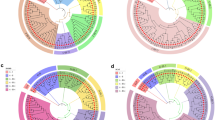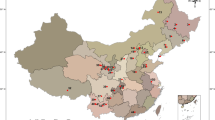Abstract
In this paper we present a method for the generation of randomly amplified polymorphic DNA (RAPD) markers for sweet potato. These were applied to produce genetic fingerprints of six clonal cultivars and to estimate genetic distances between these cultivars. The level of polymorphism within the species was extremely high. From the 36-decamer random primers used, 170 fragments were amplified, of which 132 (77.6%) were polymorphic. Ten primers resulted in no detected amplification. Of the remaining 26 primers for which amplification was achieved, only one did not reveal polymorphism. Six primers used alone enabled the discrimination of all six genotypes. Pattern analysis, which employed both a classification and ordination method, enabled the grouping of cultivars and the identification of primers which gave greatest discrimination among the cultivars.
Similar content being viewed by others
References
Devos KM, Gale MD (1992) The use of random amplified DNA markers in wheat. Theor Appl Genet 84:567–572
Gabriel KR (1971) The biplot graphical display of matrices with applications to principal components. Biometrika 58:452–462
Gower JC (1966) Some distance properties of latent root and vector methods used in multivariate analysis. Biometrika 53:325–338
Gower JC (1967) Multivariate analysis and multi-dimentional geometry. The Statistian 17:13–28
He S, Ohm H, Mackenzie S (1992) Detection of DNA sequence polymorphism among wheat varieties. Theor Appl Genet 84:573–578
Kempton RA (1984) The use of bi-plots in interpreting variety by environment interactions. J Agri Sci 103:123–135
Klein-Lankhorst RM, Vermunt A, Weide R, Liharska T, Zabel P (1991) Isolation of molecular markers for tomato (L. esculentum) using random amplified polymorphic DNA (RAPD). Theor Appl Genet 83:108–114
Martin FW (1967) The sterility-incompatibility complex of the sweet potato. Proc Int Symp Trop Root Crops, Saint Augustine, Trinidad, pp 3–15
Stiles JI, Lemme C, Sondur S, Morshidi MB, Manshardt R (1993) Using randomly amplified polymorphic DNA for evaluating genetic relationships among papaya cultivars. Theor Appl Genet 85:697–701
Tingey SV, del Tuto JP (1993) Genetic analysis with random amplified polymorphic DNA markers. Plant Physiol 101:349–352
Varadarajan GS, Prakash CS (1991) A rapid and efficient method for the extraction of total DNA from the sweet potato and its related species. Plant Mol Biol Rep 9:6–12
Welsh J, McClelland M (1990) Fingerprintinfg genomes using PCR with arbitrary primers. Nucleic Acids Res 18:7213–7218
Welsh J, Peterson C, McClelland M (1990) Polymorphisms generated by arbitrary-primed PCR in the mouse: application to strain identification and genetic mapping. Nucleic Acids Res 19:303–306
Welsh J, Honeycutt RJ, McClelland M, Sobral BW (1991) Parentage determination in maize hybrids using the arbitrarily-primed polymerase chain reaction (AP-PCR). Theor Appl Genet 82:473–476
Williams DB, Cope FW (1967) Notes on self-incompatibility in the genus Ipomoea L. Proc Int Symp Trop Root Crops, Saint Augustinee, Trinidad, pp 16–30
Williams JG, Kubelik AR, Livak KJ, Rafalski JA, Tingey SV (1990) DNA polymorphisms amplified by arbitrary primers are useful as genetic markers. Nucleic Acids Res 18:6531–6535
Williams WT (1976) Pattern analysis in agricultural science. CSIRO and Elsevier, Amsterdam, 331 pp
Author information
Authors and Affiliations
Additional information
Communicated by G. Wenzel
Rights and permissions
About this article
Cite this article
Connolly, A.G., Godwin, I.D., Cooper, M. et al. Interpretation of randomly amplified polymorphic DNA marker data for fingerprinting sweet potato (Ipomoea batatas L.) genotypes. Theoret. Appl. Genetics 88, 332–336 (1994). https://doi.org/10.1007/BF00223641
Received:
Accepted:
Issue Date:
DOI: https://doi.org/10.1007/BF00223641




